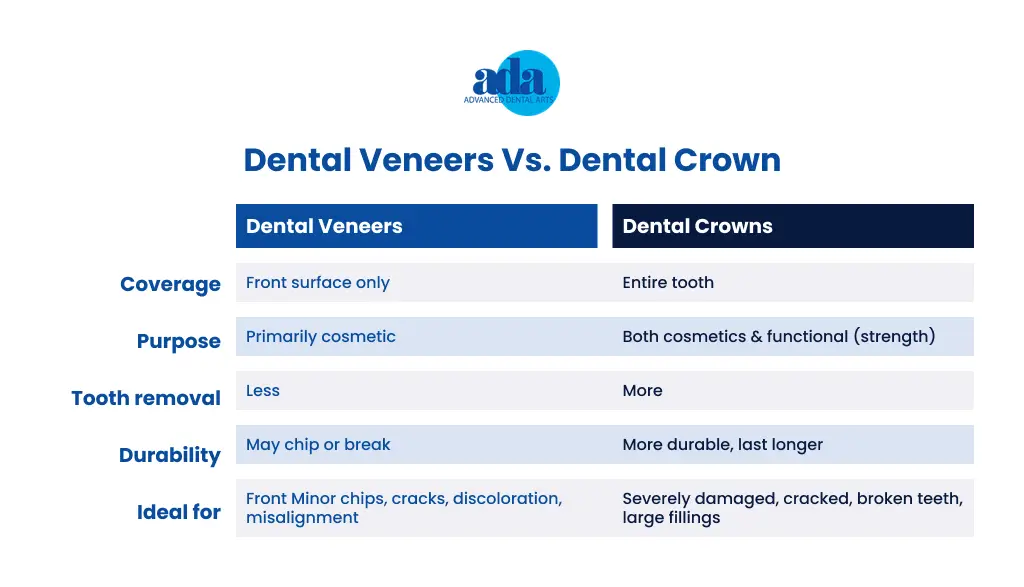US cosmetic dentists performed over 1.5 million cosmetic dentistry procedures in 2022. This shows how important a good smile is for confidence and self-esteem. But with both veneers and crowns able to improve your dentition and smile, choosing the right option can be confusing.
We’ll show you the differences between dental veneers and dental crowns to help you decide which is best.
What Are Dental Veneers?
Dental veneers are crafted, thin shells made to delicately attach to the front surface of your teeth in order to re-design your smile, improve the color, shape, or blend into your smile.
They primarily address cosmetic concerns, transforming the appearance of your teeth and thus smile.
Who Uses Dental Veneers?
Veneers are suitable if you have the following and want to improve the appearance of your smile or teeth due to :
- Discoloration: If your teeth have stubborn stains from coffee, tea, or medication. Veneers can mask these stains and make your teeth look better.
- Chips or cracks: Minor chips or cracks on the tooth enamel affect smiles. But, with veneers, you can hide them, restoring a smooth and natural appearance.
- Uneven teeth: Veneers can correct slightly misaligned or uneven teeth, giving you a more balanced dentition and making your smile look wider or more full.
- Gaps between teeth: Veneers help to cover small gaps between your front teeth, giving them a more uniform mature appearance.
Cost Range for Dental Veneers
Generally, dental veneers cost between $400 and $2,000 per tooth. However, the cost may differ based on many factors:
- Material: Porcelain veneers usually have a higher price tag than composite resin veneers because of their outstanding durability and aesthetic qualities.
- Location: Dental fees can differ based on where you stay. In cities, dental expenses tend to be higher than in rural areas.
- Dentist’s experience: Your dentist’s expertise and experience influence the cost.
- The complexity of the case: The number of teeth requiring veneers and the extent of work involved can affect the overall cost.
Benefits of Dental Veneers
If you’re considering opting for veneers, these are some of the benefits you’ll be getting:
Natural-looking smile
Your dentist will make the veneers from materials that mimic the appearance of natural teeth. This gives you a natural-looking outcome.
Minimal Tooth Removal
Compared to crowns, your dentist won’t need to remove so much underlying tooth structure for veneers. This means you can preserve more of your natural tooth.
Durable and Long-lasting
By giving them the right care, veneers can stay in great shape for many years. So, you’ll be getting a long-term solution.
Relatively Quick Procedure
The process of placing veneers usually requires the same visits as a crowns.
Risks of Dental Veneers
While veneers may seem perfect, there are still some Risks to be aware of:
- Irreversible procedure: Once bonded, you cannot easily remove them. Also, veneers require replacing if damaged or chipped.
- Potential for chipping: While durable, veneers are not invincible and can chip or break under excessive pressure. Use the same care you would as for natural teeth. Do not use teeth as tools.
- Increased sensitivity: You may experience temporary sensitivity to hot or cold after veneer placement, usually subsiding.
- Cost: Veneers can be a significant investment, and you may find it quite expensive with limited insurance coverage.
What Are Dental Crowns?
A dental crown is a tooth-like cap placed over your damaged or weakened tooth to restore its function, shape, and appearance. It acts like a protective helmet, shielding the tooth from further harm and enhancing its overall appearance. It allows the forces to be directed on the tooth in a more favorable way.
Who Needs Dental Crowns?
Several situations can warrant a dental crown. You’ll need dental crowns if you have:
- Severely decayed or fractured teeth
- Root canal treated tooth
- Worn-down teeth
- Cosmetic concerns
Benefits of Dental Crowns
Dental crowns come with a lot of benefits for you. These include:
Strength and Durability
Crowns offer superior strength and protection compared to natural teeth, especially after extensive damage or root canal procedures.
Improved Functionality
They help you regain the ability to chew and bite properly, preventing discomfort and potential problems with sensitivity.
Enhanced Aesthetics
Crowns can significantly improve teeth by correcting discoloration, cracks, chips, or misalignment.
Long-lasting Solution
Dental crowns can stay in great shape for many years if you take good care of them. This makes them a durable choice for restoring your smile in the long run.
Cons of Dental Crowns
While dental crowns have cosmetic benefits, there are also some drawbacks, which can include:
Cost
The price of dental crowns can vary, ranging from $1,000 to $3,500 per tooth. Different factors can influence the cost, including the material you choose for the crown.
A dental crown usually involves two appointments two weeks. There could be three stages:
- Assessment
- Tooth preparation and temporary
- Crown placement/cementation
These three stages require different visits, which may not be comfortable for you depending on your schedule and location.
Risk of Sensitivity
After getting a crown, you might feel temporary discomfort , especially with hot or cold food. This is normal and usually fades within weeks.
Potential for Complications
Complications such as allergic reactions to materials may occur in rare cases.
How Are Dental Crowns and Veneers Different?
The main difference between dental crowns and dental veneers comes down to how much of your tooth they cover:
Veneers may only cover the front of your teeth and are great for fixing chips, cracks, stains, or teeth that aren’t perfectly straight.
On the other hand, crowns are like caps that cover your whole tooth and are best for bigger issues like severe tooth damage, cracks, breaks, or teeth with large fillings.
Here’s a table summarizing the key differences:
Dental Veneers Vs. Dental Crown: Which Is Right for You?
Choosing between dental veneers and crowns can be tricky. Both can improve your smile, but none is a one-size-fits-all solution.
If you want to improve the appearance of your front teeth for minor chips, cracks, or discoloration, veneers might be a good option.
But, if your tooth is weak, heavily damaged, broken, or has undergone a root canal, a crown is likely the better choice for restoring strength and appearance.
It’s really important to reach out to your dentist for advice. They’ll take a look at your teeth, listen to your concerns, and suggest the most suitable solution for you.
Choose Advanced Dental Arts for Dental Veneers or Crowns
Considering dental veneers or dental crowns? It’s important to chat with a well-qualified professional first. Make sure you have a dentist assess your needs and carefully consider the potential benefits and risks.
At Advanced Dental Arts, our team of dentists is highly qualified and experienced in restoring teeth with dental crowns or veneers. Feel free to reach out with any questions – we’re here to help!







